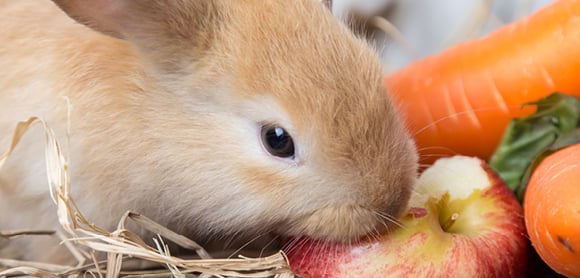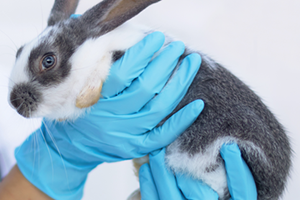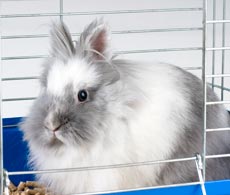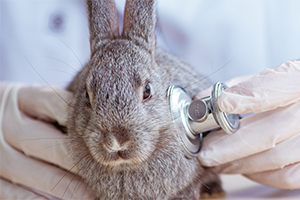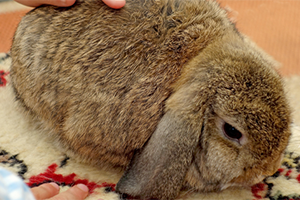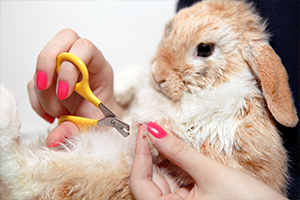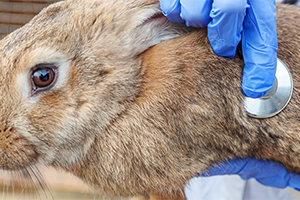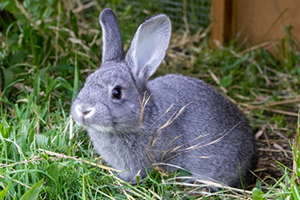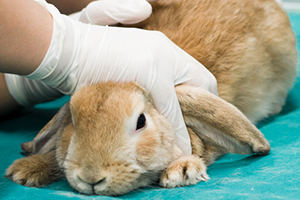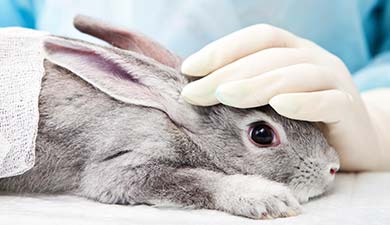How to keep rabbits cool in summer

Quick Links
How can I help my rabbits keep cool?
Make sure your outdoor rabbits have a large enough home, offering shade and plenty of access to cool, fresh water throughout the day.
If your rabbits are in a hutch and run, you might want to move them into a shed or walk-in enclosure during the summer. Here are some bunny shed ideas to get you started:
- Wooden sheds are better than plastic
- Choose a shed with a window, if possible
- Keep the door and window open to allow for ventilation
- Add insulation to shield against the heat of the summer
- Consider converting the entire shed into a bunny enclosure with an attached, shaded run – but make sure to protect against predators

How do rabbits regulate their temperature?
Wild rabbits escape the heat by chilling out in their underground burrows – but domestic rabbits can’t do the same. Rabbits don’t sweat, so instead regulate their temperature:
- Through blood vessels in their ears
- By evaporating moisture when breathing
- By lying stretched out on a cool surface
- By exchanging heat through mucous membranes in their nasal passages

Six tricks for keeping rabbits cool
Provide plenty of shade
Make sure your rabbits’ enclosure offers plenty of shade, all day long. A gazebo, garden umbrella or tarpaulin can be used to create extra shade.
In very hot weather, soak a large towel in cool water, wring it out thoroughly and place it over the top of the enclosure. Make sure there’s plenty of ventilation by leaving two opposite sides uncovered. As the towel dries out, repeat the process. You can also add an electric fan for even more cooling.
Use ice
Wrap an ice pack or frozen water bottle in a towel and place it in or next to your rabbits’ enclosure. This creates a cool spot that your rabbits may choose to lie close to – although it’s important to make sure they have other areas to lie down as well.
You can also add an ice cube to your rabbits’ water dish, but make sure they have other water available, in case they don’t like iced water.
Place ceramic, marble or slate tiles in their run
Water, water, water
Dampen your rabbits’ ears
Groom your rabbit
Watch out for fly strike
Fly strike can happen all year round, but is more likely in summer. While it’s relatively common, it can also be fatal without rapid treatment. Over the summer,check your rabbits twice a day, paying particular attention to their tails and bottoms. Make sure their hutch and enclosure are clean, and ask your vet about rabbit-friendly fly repellent.
Signs of fly strike include:
- Fur loss
- Bad smells
- Open wounds
- Decreased activity
- Decreased appetite
- Damp patches around their bottom
Without rapid treatment, fly strike can lead to seizures, collapse and even death – so always seek urgent vet treatment if you’re concerned. If you haverabbit insurance with Petplan, you can also use our Pet Expert Chat feature to speak with an expert about fly strike. Log in to your My Petplan and head to the MySupport area.

What temperature is too hot for rabbits?
The ideal temperature for outdoor rabbits is between 12°C and 21°C (54°F and 70°F). While most rabbits can tolerate temperatures as high as 25°C (77°F), anything above this can increase their risk of heatstroke.
In hot weather, rabbits that are overweight, injured or over five years old tend to find it harder to cope. They may move around less often and drink less, which means they’re at higher risk of becoming dehydrated.
Heatstroke in rabbits
During hot weather, watch out for signs of heatstroke, including:
- Hot ears
- Limp tail
- Lethargy
- Stretching out fully
- Wetness around the nose
- Rapid or shallow breathing
Heatstroke is an emergency, and the sooner it’s treated the better the chance of recovery. If you’re concerned your rabbits have heatstroke, always seek urgent vet treatment. Move your rabbits to a cool place, spritz some cool water over their ears and offer them fresh drinking water.
Do rabbits eat less in summer?
Rabbits often eat less in summer, so you might notice your rabbit is leaving some of their food uneaten. Make sure to clean this away every day, and keep an eye on your rabbits' body condition to check they’re not losing weight. Speak to your vet if you’re concerned, or ask them about whether it’s a good idea to switch to a more nutrient-dense food over the summer.
Offer your rabbits vegetables with a high water content, like cucumbers, celery and peas – but only as an occasional treat. When feeding them fresh greens, give these a rinse in cool water first, to make them extra refreshing.
Petplan is a trading name of Pet Plan Limited (Registered in England No. 1282939) and Allianz Insurance plc (Registered in England No. 84638), Registered office: 57 Ladymead, Guildford, Surrey GU1 1DB.
Pet Plan Limited is authorised and regulated by the Financial Conduct Authority. Financial Services Register No. 311969. Allianz Insurance plc is authorised by the Prudential Regulation Authority and regulated by the Financial Conduct Authority and the Prudential Regulation Authority. Financial Services Register No. 121849. Pet Plan Limited is a subsidiary of Allianz Insurance plc.




